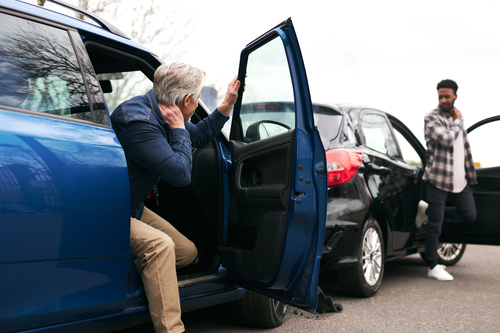Rear-end collisions are among the most frequent types of car accidents, often leading to significant injuries and property damage. Understanding the potential payout, or average settlement, for such accidents is essential for victims seeking compensation. The average payout for a rear-end collision can vary widely, depending on factors such as the severity of injuries, property damage, and the specifics of the accident. While minor fender benders may result in lower settlements, severe collisions can lead to compensation that covers medical expenses, lost wages, pain and suffering, and more.
In this blog, we’ll explore the factors that influence the average payout for a rear-end collision, provide insight into how settlements are determined, and explain why consulting with an experienced Atlanta car accident lawyer can help ensure you receive the compensation you deserve.
Amount Settlement Amounts in Georgia
Rear-end collision settlements in Georgia vary significantly depending on the details of the accident, similar to other car accident settlements. The factors contributing to these settlement amounts are driven by the nature of the collision, the injuries sustained, and the severity of the damage. Settlements can range from a few thousand dollars for minor incidents to millions of dollars for severe or fatal accidents.
Minor Rear-End Collisions
In cases of minor rear-end collisions, such as fender benders, settlement amounts typically range between $5,000 and $10,000. These accidents generally result in minimal property damage and minor injuries. Compensation covers vehicle repair costs, minor medical treatment, and possibly some lost wages, but it is unlikely to include significant non-economic damages like pain and suffering.
Moderate Rear-End Collisions
Moderate rear-end accident settlements involve more severe injuries and damage than minor accidents. Settlement amounts for these incidents typically range from $15,000 to $50,000. Injuries may include whiplash, back pain, or soft tissue injuries that require medical treatment and therapy. In addition to covering vehicle repairs and medical bills, settlements for moderate collisions often include compensation for lost wages and ongoing medical expenses.
Severe Rear-End Collisions
Severe rear-end collisions result in serious injuries such as spinal cord damage, broken bones, or traumatic brain injuries. Settlements in these cases often exceed $100,000. Compensation includes medical expenses for long-term treatment, significant loss of wages, and non-economic damages like pain and suffering. These higher settlements reflect the long-term impact on the victim’s quality of life and future earning capacity.
Multi-Vehicle Rear-End Collisions
When a rear-end collision involves multiple vehicles, the settlement amounts increase due to the complexity of claims. These settlements generally range between $75,000 and $150,000. Multiple parties may share liability, and the damages, both physical and financial, tend to be more extensive. Compensation covers medical expenses, lost wages, and vehicle repairs for all parties involved.
Commercial Vehicle Rear-End Collisions
Rear-end collisions involving commercial vehicles often lead to significant settlements, typically ranging from $200,000 to $500,000. Commercial vehicle accidents tend to cause more severe injuries, leading to higher medical costs and greater loss of income. The involvement of a commercial entity, such as a trucking company, can result in higher settlement amounts due to the increased liability coverage available.
Fatal Rear-End Collisions
In tragic cases where a rear-end collision results in a fatality, settlement amounts can range from $500,000 to several million dollars. These settlements aim to compensate the victim’s family for funeral expenses, loss of income, and emotional suffering. Wrongful death claims generally lead to much higher payouts due to the devastating impact on the family left behind.
Factors Affecting Settlement Amounts
Several key factors influence the amount of a rear-end collision settlement in Georgia. Each case is unique, and understanding these factors can provide a clearer picture of what determines the compensation received.
Severity of Injuries
The severity of the injuries sustained in the collision plays a central role in determining the settlement amount. More severe injuries, such as broken bones, spinal cord damage, or traumatic brain injuries, result in higher compensation. Injuries that require long-term treatment, surgeries, or result in permanent disability tend to command significantly larger settlements due to the impact on the victim’s life.
Medical Expenses
Medical expenses, both immediate and long-term, are a major factor in the final settlement amount. These expenses include emergency room visits, surgeries, hospital stays, physical therapy, and any ongoing treatment. The more extensive the medical care required, the higher the settlement will typically be to cover those costs.
Lost Wages
In cases where the injured party is unable to work due to their injuries, lost wages are factored into the settlement. This includes both past wages missed during recovery and any future loss of income if the injuries prevent the victim from returning to their previous employment. Calculating lost wages often requires assessing the person’s earning capacity and the time they will be out of work.
Property Damage
Property damage is another factor in determining the settlement amount. Rear-end collisions often result in significant damage to vehicles, especially in more severe cases. Settlement amounts cover vehicle repairs or replacement costs if the car is totaled. The more severe the damage to the vehicle, the higher the compensation for property damage.
Pain and Suffering
Non-economic damages, such as pain and suffering, can significantly increase the settlement amount. This factor considers the physical pain and emotional distress caused by the accident. Chronic pain, loss of mobility, and psychological trauma, such as post-traumatic stress disorder (PTSD), are examples of conditions that contribute to this portion of the settlement.
Liability and Fault
Georgia’s comparative negligence law affects the settlement amount if both parties share responsibility for the accident, especially in cases where one party has been rear ended. If the injured party is found partially at fault, their compensation will be reduced in proportion to their degree of fault. Establishing clear liability is crucial for maximizing settlement amounts, as any fault assigned to the victim reduces the payout.
Insurance Policy Limits
The at-fault driver’s insurance policy limits also impact settlement amounts. If the damages exceed the available coverage, the injured party may need to pursue additional compensation through other means, such as the at-fault party’s personal assets or their own underinsured motorist coverage. Higher policy limits generally result in larger settlements.
Key Steps to Take After a Rear-End Collision
Following a rear-end collision, taking the right steps is essential to protect your health, legal rights, and potential compensation. These actions can significantly impact the outcome of any legal claims or insurance settlements. Consulting with a personal injury attorney can help ensure you take the right steps to protect your legal rights and maximize your compensation.
Ensure Safety and Seek Medical Attention
Your first priority should be safety. Move your vehicle to a safe location if possible and check for injuries. Even if you feel fine initially, it’s critical to seek medical attention. Some injuries may not be immediately apparent but could worsen over time. Getting a prompt medical evaluation also creates a record of your injuries, which will be essential for your claim.
Document the Accident Scene
Thorough documentation of the accident scene is vital. Take photographs of the damage to all vehicles involved, as well as the surrounding area, including road conditions, traffic signs, and any skid marks. Gather contact information from witnesses who can provide testimony if needed. This evidence can support your case when negotiating with insurance companies or pursuing legal action.
File a Police Report
Contact law enforcement to report the accident. In Georgia, a police report is required for accidents involving injuries, fatalities, or property damage exceeding $500. The police report will provide an official account of the incident, including details of the parties involved, witness statements, and any citations issued. This report is a critical piece of evidence in your claim.
Notify Your Insurance Company
After ensuring safety and gathering evidence, notify your insurance company about the collision. Provide them with the details of the accident, including the police report and any photos you have taken. Timely reporting is important, as failing to do so can impact your ability to claim under your policy.
Contact an Experienced Atlanta Car Accident Attorney ASAP!
If you’ve been involved in a rear-end collision and are unsure about your legal options, don’t navigate the process alone. Our team at Atlanta Accident Lawyers is here to help you understand your rights, negotiate with insurance companies, and fight for the compensation you deserve.
Contact us at 864-444-2062 for a free consultation today!





